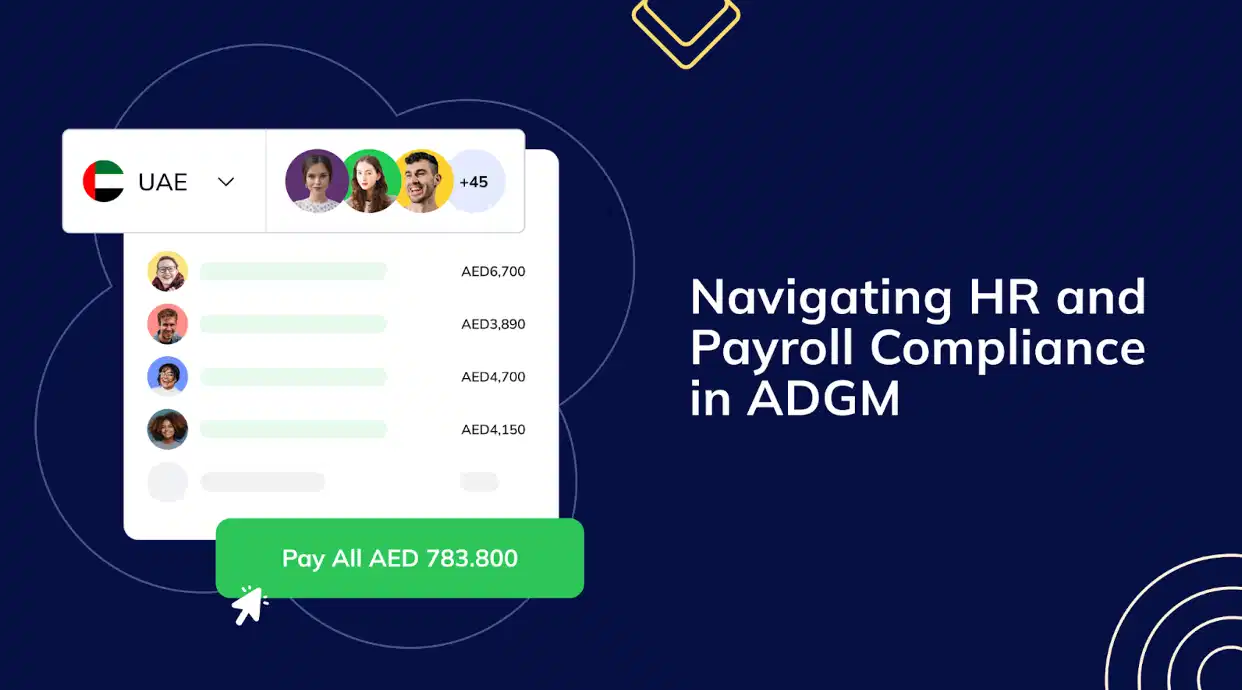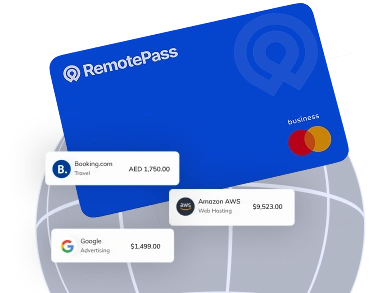Operating within the Abu Dhabi Global Market (ADGM) can make HR and payroll compliance seem challenging. But, it doesn’t have to be.
With the right guide (this one, for example), navigating ADGM’s unique regulations becomes much simpler. Whether you're an HR professional, payroll manager, or business leader expanding into ADGM, this article covers the key rules and requirements, helping you stay compliant without losing time or money.
What Makes ADGM So Unique?
ADGM distinguishes itself by operating under its own legal framework, based on English common law, which provides a familiar and trusted system for international businesses. This regulatory environment offers a more globally aligned alternative to the mainland UAE’s system, making it especially appealing to foreign firms.
What sets ADGM apart is its innovative regulatory approach. As Salem Mohammed Al Darei, CEO of ADGM Authority, explained in a recent interview, “The ADGM continues to build digital capabilities in both regulatory technology (RegTech) and supervisory technology (SupTech) to not only supervise but also support the financial services industry’s compliance capabilities. Our end goal is to build a more secure, efficient, and innovative financial ecosystem that is both progressive and functional.”
This emphasis on innovation, coupled with strict compliance, is key to ADGM’s appeal, helping it attract top global institutions and expand its jurisdiction.
Additionally, ADGM’s independent HR and payroll regulations create unique compliance requirements. Managing local, international, and remote teams in this environment requires businesses to understand these specific rules to stay efficient and compliant.
HR and Payroll Compliance in ADGM: What You Need to Know
When it comes to compliance in the ADGM, it's not just about doing the bare minimum—there are serious financial repercussions for falling short. Just ask the six financial institutions that were hit with AED 170,000 in fines in February 2024. Their offence? Failing to follow due diligence procedures and keep accurate records as required under the Common Reporting Standard Regulations 2017.
And they’re not alone. Back in September 2022, five other businesses were fined between AED 30,000 and AED 119,000 for similar violations, including not obtaining valid tax information from clients. These hefty fines highlight the high stakes of non-compliance in ADGM, regardless of your industry.
Though these examples are from the financial sector, they serve as a strong reminder for all businesses. Whether it's payroll, HR, or tax reporting, staying compliant isn’t optional. Here's a detailed breakdown of what you need to keep in mind:
Employment Contracts
Under the ADGM regulations, employment contracts are mandatory, written, and must be provided within the first month of employment. An employment contract should not be confused with an offer letter, as these are two distinct things. Before starting a new job, a potential employer will typically send an offer letter. An offer letter is good practice but isn’t mandatory. Think of it as a preliminary agreement that outlines the basic terms of employment such as the job title, starting date, duration, and salary.
Once the offer is accepted, an employment contract is signed. This formal, legally binding document details all aspects of the job, including:
- Employee wages and payment details, including pay period
- Working hours
- Leave entitlements (like annual, sick, and maternity leave)
- Notice period for termination
- Job title and description
- Probation period details
- Reporting structure
- Benefits (e.g, health insurance)
- Termination clauses
- Disciplinary procedures
This document ensures both parties have a clear understanding from the outset, preventing the possibility of confusion or disputes later on. Employers in ADGM may use various employment contracts based on their business needs. The most common types include limited-term, unlimited-term, part-time, project-based, and freelance contracts. Failure to provide a proper contract can result in fines, and employees can seek a court order to determine the terms that should have been included.
Working Hours
In the ADGM, employees can work up to 48 hours per week, usually spread over six days. Employers are also required to provide at least one day off per week. This system’s simplicity ensures workers have enough downtime without complicating payroll calculations.
Leave Entitlements
ADGM takes employee well-being seriously, and its leave entitlements reflect this:
- Annual Leave: Employees are entitled to a minimum of 20 calendar days of paid vacation every year.
- Sick Leave: Employees can take up to 60 days of sick leave. The pay structure here is tiered—full pay for the first portion, and reduced pay as time goes on.
- Maternity Leave: Expecting mothers receive 65 days of maternity leave with full pay.
- Paternity Leave: Male employees are entitled to five working days of paternity leave.
- Public Holidays: Employees are entitled to public holidays as outlined by the UAE’s federal calendar.
These regulations ensure that employees have time to recover, recharge, and take care of their personal needs, all while maintaining some financial stability.
End-of-Service Benefits
Under Employment Regulations 2019 Sections 59(1), “An Employee who completed continuous employment of 1 year or more is entitled to a gratuity payment at the termination of the Employee’s employment." Essentially, when an employee leaves your company, whether through resignation or termination, they’re entitled to end-of-service benefits, commonly referred to as gratuity.
The gratuity is calculated based on the employee's years of service and their latest basic wage. For the first five years of service, the gratuity is 21 days' basic wage per year. After that, it increases to 30 days' basic wage per year. However, the total gratuity cannot exceed two years' worth of basic wages. If an employee's termination occurs before completing a full year, the gratuity is calculated proportionally.
Health Insurance
In ADGM, employers are responsible for providing health insurance that meets local standards. This isn’t just about staying compliant; it’s about ensuring your team has access to healthcare when they need it. Employers must cover the costs, meaning employees aren’t responsible for arranging their health coverage. Comprehensive health benefits can help your organization attract and retain top talent.
Payroll Compliance Challenges in ADGM: What You Need to Know
Imagine this scenario: An ADGM-based company hires an international employee but fails to accurately calculate and remit the required end-of-service gratuity payments when the employee's contract ends. As a result, the employee files a complaint with the ADGM authorities, triggering an investigation and potential legal action against the company.
This is just one example of what could go wrong if a company doesn't comply with the specific regulations governing employee-employer relationships in ADGM. From ensuring accurate wage calculations to managing leave entitlements, staying compliant is critical. Let’s dive into the key challenges businesses face and how you can proactively address them to avoid such pitfalls.
Accurate Wage Calculations
Payroll compliance in ADGM isn’t a “set it and forget it” operation. It’s a complex process that involves more than just cutting a paycheck—every detail must be accurate. You need to account for basic wages, allowances, overtime (1.25x for regular, 1.5x for late nights and holidays), and deductions. If an employee takes sick leave or has any unpaid time off, it has to be accurately reflected in the payroll. And since precision is non-negotiable, cutting corners could lead to compliance violations or upset employees.
Payroll Deadlines
Deadlines in ADGM are strict—once a pay period ends, you have just one month to ensure your employees’ wages are in their bank accounts. Missing that deadline doesn't only lead to financial penalties; it can also damage employee trust and morale. On top of that, you might attract fines that could affect your bottom line.
Gratuity Payments
End-of-service gratuity in ADGM is calculated differently than in mainland UAE, and getting it wrong can cause legal headaches. As earlier stated, the formula is:
- 21 days’ pay for each of the first five years of service
- 30 days’ pay for each year thereafter
It’s crucial to stay on top of these numbers, as errors could lead to disputes, fines, and reputational damage.
Managing a Global Workforce: Local vs. Remote Challenges
Handling payroll for local ADGM employees is already complex, but managing workers across multiple countries adds another layer of difficulty. Each country has its own labor laws, tax rules, and leave policies, making compliance a challenge. Time zones, different benefits, and legal requirements add to the complexity— one slip-up could mean non-compliance.
You also need to consider exchange rates, transaction fees, and country-specific tax regulations.
That’s not all—leave policies vary from country to country, and managing annual, sick, and parental leave can become a challenge when you’ve got an international team. To keep things running smoothly and fairly, you’ll need clear policies and reliable tools for managing payroll and leave days. It’s the only way to stay compliant while keeping your team happy, no matter their location.
RemotePass Saves the Day
RemotePass, your all-in-one solution for HR and payroll management, tackles these challenges head-on. Here’s how:
1. Automating Compliance Updates:

ADGM's structured regulatory framework can present a compliance challenge, especially when laws are updated. RemotePass simplifies this by offering automated compliance management. For businesses operating in ADGM, the platform automatically adjusts to reflect changes in employment laws and payroll regulations—no need for manual intervention.
RemotePass ensures your business keeps pace with ADGM’s evolving requirements—employment contract updates, wage calculations, and end-of-service benefits—while reducing the risk of non-compliance, particularly for smaller HR teams.
2. Centralizing HR and Payroll Functions:

Managing both local and global employees is tricky without a unified system. RemotePass seamlessly integrates with your existing HR and accounting tools, ensuring all employee data, payroll, and benefits are managed in one place. This means fewer manual errors, quicker payroll processing, and a centralized overview of every employee, regardless of their location.
3. Simplifying Payments Across Currencies:

Handling payroll across multiple countries can be a headache—different currencies, exchange rates, and fees all complicate the process. RemotePass simplifies this by supporting payments in over 90 currencies, ensuring that your local and global employees get paid accurately and on time.
4. Automating Benefits Management:

RemotePass automates end-of-service gratuity calculations, ensuring employees receive the right benefits while keeping your business compliant. This frees up your HR team to focus on more strategic tasks rather than manual admin work.
5. A Unified Approach for Efficiency:

RemotePass boosts efficiency by consolidating HR and payroll functions onto one platform. Moreso, our platform offers real-time insights into workforce data, helping you make smarter decisions and align your HR strategies with broader business goals.
With RemotePass, you can focus on growth, confident that your HR and payroll systems are running smoothly and remaining compliant with ADGM’s requirements.
Start with RemotePass today and experience streamlined HR and Payroll in ADGM.

.svg)








.svg)
























_EasiestToDoBusinessWith_EaseOfDoingBusinessWith%20(1).svg)





.svg)
















